- Home
- David McCullough
The American Spirit Page 8
The American Spirit Read online
Page 8
Unfortunately, we are raising a generation of young Americans who are by and large historically illiterate. Innumerable studies have been made and there’s no denying it. I’ve experienced it myself again and again. I had a young woman come up to me after a talk I had given at a college in Missouri to thank me for coming to the campus, because, she said, “until now I never understood that the original thirteen colonies were all on the East Coast.”
Now you hear that and you think: What in the world have we done? How could this fine young American, a student at a good college, not know that?
I taught a seminar at one of our Ivy League colleges of twenty-five seniors, all majoring in history, all honor students. The first morning we met, to get things going, I asked, “How many of you know who George C. Marshall was?”
Not one. There was a long silence. Finally one young man asked, “Did he maybe have something to do with the Marshall Plan?” And I said yes, he certainly did, and that was a good way to begin talking about George Marshall.
We have to do several things. First of all we have to get across the idea that we have to know who we were if we’re to know who we are and where we’re headed. This is essential. We have to value what our forebears—and not just in the eighteenth century, but our own parents and grandparents—did for us, or we’re not going to take it very seriously, and it can slip away. If you don’t care about it—if you’ve inherited some great work of art that is worth a fortune and you don’t know that it’s worth a fortune, you don’t even know that it’s a great work of art and you’re not interested in it—you’re going to lose it.
We have to do a far better job of teaching our teachers. The great teachers—the teachers who influence you, who change your lives—almost always, I’m sure, are the teachers who love what they are teaching. It is that wonderful teacher who says, “Come over here and look in this microscope, you’re really going to get a kick out of this.”
There was a wonderful professor of child psychology at the University of Pittsburgh named Margaret McFarland. I wish her ideas were better known. She said that attitudes aren’t taught, they’re caught. If the teacher has enthusiasm for the subject at hand, the student catches that, be it in second grade or graduate school. She said, “Show them what you love.”
Also, if the teachers know what they are teaching, they are much less dependent on textbooks. I don’t know when you last picked up an American history textbook. There are, to be sure, some very good ones. But most, it would seem, have been created in order to kill any interest one might have in history.
I’ve had the thought that students might be better served if the teacher were to cut out all the pages, clip off the page numbers, then mix them all up and ask the student to put it all back together in the right order. Too many of the textbooks are dreary, done by committee, often hilariously politically correct. Students should not have to read anything that we wouldn’t want to read ourselves. And there are wonderful books, past and present. There is literature in history—Longfellow, for example, Lincoln’s Second Inaugural Address, the speeches of Martin Luther King.
History isn’t just something that ought to be taught, read, or encouraged only because it will make us better citizens. It will make us a better citizen and it will make us more thoughtful and understanding human beings. It should be taught for the pleasure it provides. The pleasure of history, like art or music or literature, consists in an expansion of the experience of being alive, which, indeed, is what education is largely about.
And we need not leave the whole job of teaching history to the teachers. If I could have you come away from what I have to say tonight remembering one thing, it would be this: The teaching of history, the emphasis on the importance of history, the enjoyment of history, should begin at home.
We who are parents or grandparents should be taking our children to historic sites. We should be talking about those books in biography or history that we have particularly enjoyed, or those characters in history who have meant something to us. We should be talking about what it was like when we were growing up in the olden days. Children, particularly young children, love this. And in my view, the real focus should be at the grade-school level. We all know that those young children can learn languages so fast it takes your breath away. The fact is they can learn anything so fast it takes your breath away. And the truth is they want to learn. They can be taught to dissect a cow’s eye. They can be taught anything.
There’s no great secret to teaching history or to making history interesting. Barbara Tuchman said it in two words, “Tell stories.” That’s what history is: story.
And what’s a story? E. M. Forster gave a wonderful definition to it: If I say to you the king died and then the queen died, that’s a sequence of events. If I say the king died and the queen died of grief, that’s a story. That’s human. That calls for empathy on the part of the teller of the story and of the reader or listener to the story.
We ought to be growing, encouraging, developing historians who have heart and empathy enough to put students in the time and circumstances of those before us who were just as human and real as we are.
We’ve got to teach history and nurture history and encourage history because it’s an antidote to the hubris of the present—the idea that everything we have and everything we do and everything we think is the ultimate, the best.
We should never look down on those of the past and say they should have known better. What do you think they will be saying about us in the future? They’re going to be saying we should have known better. Why in the world did we do that? What could we have been thinking?
Samuel Eliot Morison said we ought to read history because it will help us to behave better. It does. And we ought to read history because it helps to break down the dividers between the disciplines of science, medicine, philosophy, art, music. It’s all part of the human story and ought to be seen as such. You can’t understand it unless you see it that way. You can’t understand the eighteenth century, for example, unless you understand the vocabulary of the eighteenth century. What did they mean by those words?
There’s a line in one of the letters written by John Adams where he’s telling his wife, Abigail, at home, “We can’t guarantee success [in this war] but we can do something better. We can deserve it.” Think how different that is from the attitude today when all that matters for far too many is success, being number one, getting ahead, getting to the top. However you betray or claw or cheat is immaterial if you get to the top.
That line in the Adams letter is saying that how the War for Independence turns out is in the hands of God. We can’t control that, but we can control how we behave. We can deserve success. When I read that line while doing research for my book on John Adams, it practically lifted me out of my chair. Then about three weeks later I was reading some correspondence written by George Washington and there was the very same line. I thought, wait a minute, what’s going on? They must be quoting something. So, I got down Bartlett’s Familiar Quotations, and started going through the entries from the eighteenth century and there it was! The line is from the play Cato by Joseph Addison. They were quoting something from the literature of the time, scripture of a kind, a kind of secular creed if you will. And we can’t fully understand why they behaved as they did then if we don’t understand that. We can’t understand why honor was so important to them and why they were truly ready to put their lives, their fortunes, their sacred honor on the line. Those weren’t just words.
I want to read to you a letter young John Quincy Adams received from his mother. The boy was being taken across the North Atlantic in the midst of winter, in the midst of war. Just outside Boston Harbor British ships were waiting to capture somebody like John Adams and take him to London, where most likely he would be hanged as a traitor. But the boy went, too, his mother knowing that she probably wouldn’t see him again for a year or more, maybe never.
Why? Because she and his father wanted John Quincy to be in associa
tion with Franklin and the great political philosophers of France, to learn to speak French, to travel in Europe, to be able to soak it all up. And they risked his life for that—for his education.
We have little idea of what people were willing to do for education in times past. It’s the one sustaining theme through our whole history—that the next generation will be better educated than we are. John Adams himself was a living example of the transforming miracle of education. His father was able to write his name, we know. His mother was almost certainly illiterate. But because he had a scholarship to Harvard, everything changed for him. As he said, “I discovered books and read forever,” and he did. And he and Abigail wanted this for their son no less.
It was a horrendous voyage. Everything that could have gone wrong, went wrong. And when the boy came back, he said he didn’t ever want to go across the Atlantic again as long as he lived. And then his father was called back, and his mother said you’re going back. And here is what she wrote to him. And please keep in mind this is being written to an eleven-year-old boy and listen to how different it is from how we talk to our children in our time. It’s as if she were addressing a grown-up. She’s talking to someone they want to bring along quickly because there’s work to do and survival is essential:
These are the times in which a genius would wish to live. It is not in the still calm of life or the repose of a pacific station that great characters are formed. The habits of a vigorous mind are formed in contending with difficulties. Great necessities call out great virtues. When a mind is raised and animated by scenes that engage the heart, then those qualities which would otherwise lay dormant wake into life and form the character of the hero and the statesman.
Now, there are several interesting things going on in that letter. For all the times that she mentions the mind, in the last sentence she says, “When a mind is raised and animated by scenes that engage the heart, then those qualities which would otherwise lay dormant wake into life and form the character of the hero and the statesman.” In other words, the mind itself isn’t enough. You have to have the heart.
Well, of course he went and the history of our country is different because of it. John Quincy Adams, in my view, was the most superbly educated and maybe the most brilliant human being who ever occupied the executive office. He was a great secretary of state—he wrote the Monroe Doctrine, among other things—and he was a wonderful human being and a great writer. Told to keep a diary by his father when he was in Europe, he kept the diary for sixty-five years. And the diaries are extraordinary, essays on all manner of subjects.
After the war was over, Abigail went to Europe to be with her husband when he became our first minister to the Court of St. James’s. And John Quincy came home from Europe to prepare for Harvard. And he had not been home in Massachusetts very long when Abigail received a letter from her sister saying that John Quincy was a very impressive young man—and that of course everybody was quite astonished that he could speak French—but, alas, he seemed overly enamored with himself and with his own opinions and that this was not going over very well in town. So Abigail sat down in a house that still stands on Grosvenor Square in London and wrote a letter to John Quincy. And here’s what she said:
If you are conscious to yourself that you possess more knowledge upon some subjects than others of your standing, reflect that you have had greater opportunities of seeing the world and obtaining knowledge of mankind than any of your contemporaries. That you have never wanted a book, but it has been supplied to you. That your whole time has been spent in the company of men of literature and science. How unpardonable would it have been in you to have turned out a blockhead.
How unpardonable it would be for us—with so much that we have been given, the advantages we have, all the continuing opportunities we have to enhance and increase our love of learning—to turn out blockheads. Or to raise blockheads.
What we do in education, what these wonderful teachers and administrators and college presidents and college and university trustees do is the best, most important work there is.
So I salute you all for your interest in education and in the education of Hillsdale. I salute you for coming out tonight to be at an event like this. Not just sitting at home being a spectator. It’s important that we take part. Citizenship isn’t just voting. We all know that. Let’s all pitch in. And never lose heart.
The Ties That Bind
THE 250TH BIRTHDAY OF THE MARQUIS DE LAFAYETTE
LAFAYETTE COLLEGE
Easton, Pennsylvania
2007
The triumphal return of the Marquis de Lafayette to America in the year 1824 produced a public outpouring of goodwill and gratitude across the nation unlike that ever inspired by a visitor from abroad, before or since. The grand tour that began with his arrival at New York on August 16, covered all twenty-four states of the Union and went on for thirteen months. The country had never experienced anything like it. Everywhere Lafayette was greeted with huge, unprecedented, wildly enthusiastic crowds. “All through this trip,” he wrote, “we have felt everything which can touch or flatter the human heart.” When the mayor of a little town near Boston told him, “Sir, America loves you,” Lafayette replied, “Sir, I truly love America,” and no one doubted he meant every word.
Marquis de Lafayette by Samuel F. B. Morse
He traveled more than six thousand miles, as far north as Burlington, Vermont, west as far as St. Louis, south all the way to New Orleans. He traveled the Mississippi River, the Ohio, the new Erie Canal. He saw Niagara Falls. He was Jefferson’s guest at Monticello and visited Andrew Jackson at the Hermitage. At Mount Vernon, in one of the most moving moments of the odyssey, he paid homage at the tomb of George Washington. Daniel Webster delivered the welcoming oration at ceremonies at Bunker Hill.
He visited Harvard, Yale, and Princeton. Dedicating a library at Brooklyn, he paused to bestow a kiss on a little boy who happened to be Walt Whitman. At Philadelphia, Independence Hall, which had fallen into shameful decay, was resuscitated and thus saved, in order to provide the famous guest a fitting place to greet his adoring public.
He was hailed as the last remaining general of the Continental Army and “the venerable symbol of a past heroic age.” One contemporary account after another describes the resplendent triumphal arches erected, the parades and elegant carriages drawn by white horses, banners and flags flying, cannon booming, dinners and dancing and choral oratorios, and crowds such as no one had ever seen. And Lafayette, though old and lame, thrived on it. Indeed, by all appearances, it was the happiest he had ever been. As Jefferson noted, the illustrious Frenchman had “a canine appetite for popularity and fame.”
Though the so-called Era of Good Feeling under President James Monroe was, like Monroe’s time in office, drawing to a close, and there were issues of insistent, troubling kinds manifesting themselves—the extension of slavery being not the least of them—the mood of the country overall was confident, optimistic. Signs of material progress were plain to be seen on all sides, as countless speakers, including Lafayette, made a great point of.
Above all, the show of gratitude was both resonant and genuine—gratitude not only for the heroic part Lafayette had played in the struggle for American independence, but for those of the whole founding generation of Americans who had made possible the blessings and unparalleled opportunities of the new nation.
Moreover, the yearlong pageantry marked a celebratory start to what would prove down the years an extraordinary relationship between France and the United States, which, if not always smooth or easy, was nonetheless like that we have known with no other country, and of greater, more lasting benefit than is commonly appreciated. And this was all the more remarkable given that France, let us remember, had been our first enemy, during the French and Indian War, and only a scant decade or so before the start of the American Revolution.
It was well into the Revolutionary War before we and the French became allies. That was agreed to formally ea
rly in 1778 in Paris and it was one of the most fateful agreements in our history. The young Lafayette, meanwhile, had arrived on our shores at age nineteen to offer his services as a soldier in the Glorious Cause of America and to earn his place as a full-fledged American hero.
Perhaps we could have won the Revolutionary War without help from France, perhaps not. There is no clear answer. But certainly we would not have succeeded when we did had it not been for the French. As too few Americans seem to understand, the French troops under Rochambeau at Yorktown, the last great battle of the war, numbered more than our own forces under Washington, and it was the arrival of the French fleet at exactly the right time off the Virginia Peninsula that left Cornwallis no choice but to surrender.
It was again in Paris that the treaty was signed ending the war—the all-important treaty in which His Britannic Majesty George III recognized the United States to be “free, sovereign, and independent states.” A plaque on the white wall of the old Hôtel d’York on rue Jacob marks the spot.
American history was made that day in Paris, September 3, 1783. The new independent United States of America had arrived on the world stage. And in the time since, more American history has unfolded in France than in any country other than our own.
Benjamin Franklin and John Adams, having served all-important diplomatic roles in Paris during the war, and in the negotiations that ended it, were afterward joined by Thomas Jefferson, who was to stay on in Paris as our minister to France for five years—five of the happiest years of Jefferson’s life.
During World War I more than two million American soldiers served “over there.” (Contrary to popular understanding, the famous line, “Lafayette, we are here,” was not delivered by General Pershing on his arrival, but by Colonel Charles Stanton at a ceremony at Lafayette’s grave.) Nearly 80,000 Americans died in France in World War I. During World War II another generation of American soldiers, in all 790,000, served in France, and more than 57,000 died there.

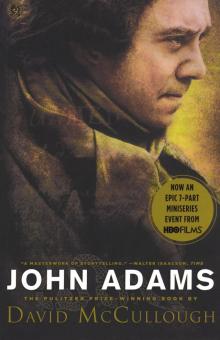 John Adams
John Adams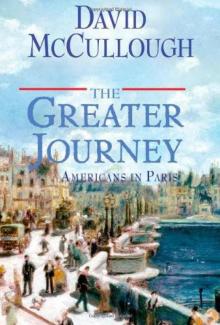 The Greater Journey: Americans in Paris
The Greater Journey: Americans in Paris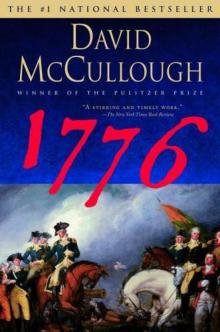 1776
1776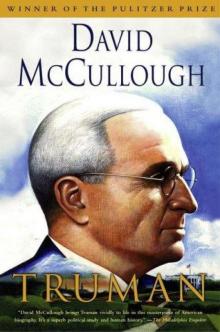 Truman
Truman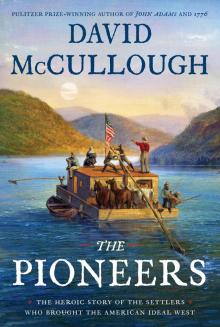 The Pioneers
The Pioneers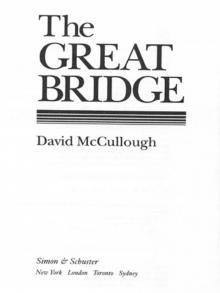 The Great Bridge: The Epic Story of the Building of the Brooklyn Bridge
The Great Bridge: The Epic Story of the Building of the Brooklyn Bridge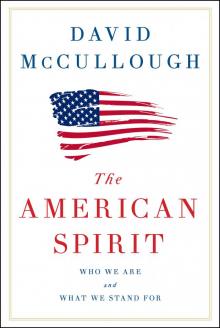 The American Spirit
The American Spirit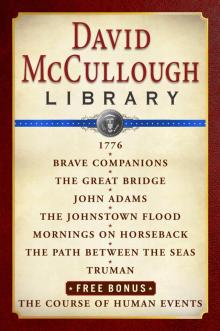 David McCullough Library E-book Box Set
David McCullough Library E-book Box Set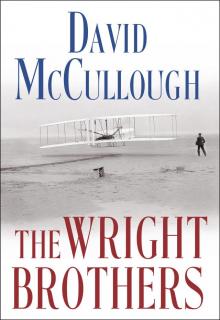 The Wright Brothers
The Wright Brothers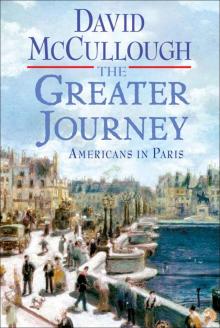 The Greater Journey
The Greater Journey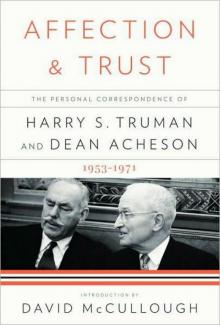 Affection and Trust: The Personal Correspondence of Harry S. Truman and Dean Acheson, 1953-1971
Affection and Trust: The Personal Correspondence of Harry S. Truman and Dean Acheson, 1953-1971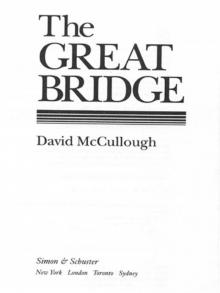 The Great Bridge
The Great Bridge